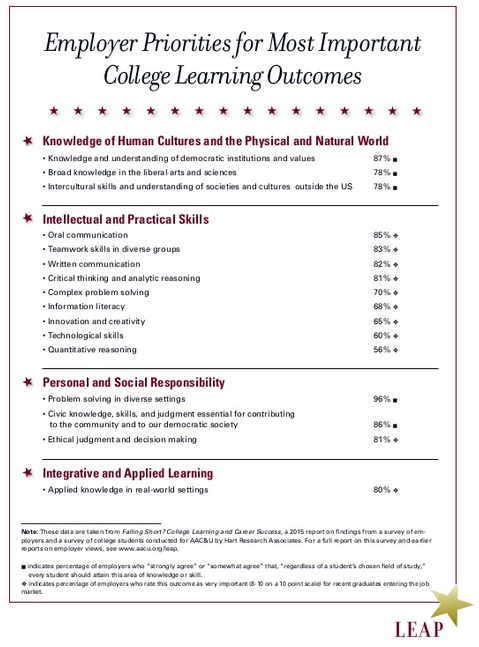Academic credentials — such as diplomas, certifications, and certificates — have served as proxies for bundles of knowledge, practices, skills, and competencies for most of the past century and longer.
Now, due to the rapid evolution of the Internet, some traditional academic credentials are being expanded (or unbundled) into the learning outcomes, competencies, and practices that they represent.
Understanding these component competencies can help learners prepare for thriving at home, at work, and in civic life.
In K-12 education, Maine’s Learning Results — created in 1996 and updated in 2007 and 2013 — unbundled content area knowledge into competencies to be mastered along the pathways through lessons, units, courses, and high school diplomas.
In higher education, the University of Maine at Presque Isle is unbundling its majors into competencies that students can master through learning opportunities in classroom settings, as well as learning communities and collaborative projects.
Maine’s community colleges are building IT certificates from stackable credentials, or series of industry-recognized certifications. Training and professional development programs have long associated competencies with certifications.
In addition to the hard skills — deeper knowledge in specific academic and career competencies — there is growing recognition of the value of life skills — variously called foundational skills, life/work skills, 21st-century skills, and habits of mind — that help learners thrive throughout their personal and professional lives. (These are more than the “soft skills” of interpersonal communication, and include critical thinking and creative problem solving.)
Indeed, Maine was ahead of its time in that area as well. The Maine Learning Results included a set of cross-disciplinary competencies, called the Guiding Principles:
Each Maine student shall leave school as:
- A clear and effective communicator
- A self-directed and lifelong learner
- A creative and practical problem solve
- A responsible and involved citize
- An integrative and informed thinker
Detailed outline: https://checkvist.com/checklists/443728
In many Maine high schools starting with the class of 2018, students will need to demonstrate mastery of these cross-disciplinary competencies in order to earn a diploma. (Maine LD 1422)
Proficiency-based diploma: http://webiva-downton.s3.amazonaws.com/342/d4/8/606/nessc_briefing_no5.pdf |http://newenglandssc.org/Leadership_In_Action
In a survey of 319 employers by the American Association of Colleges and Universities in 2013, 59% strongly agreed that “candidates’ demonstrated capacity to think critically, communicate clearly, and solve complex problems is more important than their undergraduate major.”
Source: http://www.aacu.org/meetings/institute_gened/documents/HumphreysItTakesMore.pdf | Excerpts from all AACU employers surveys: http://goo.gl/ZOm2RO
Our business and organizational partners concur: when hiring college interns and entry-level employees, they choose students with stronger foundational skills and more real-world experience. This is a point of distinction for graduates who are so prepared.
Here in Maine, the Maine Development Foundation’s quarterly jobs report identifies skills clusters in demand by Maine employers, based on analysis of online job listings by Burning Glass. In a recent report (December, 2013), the top 6 skills clusters were foundational and computing/digital competencies:
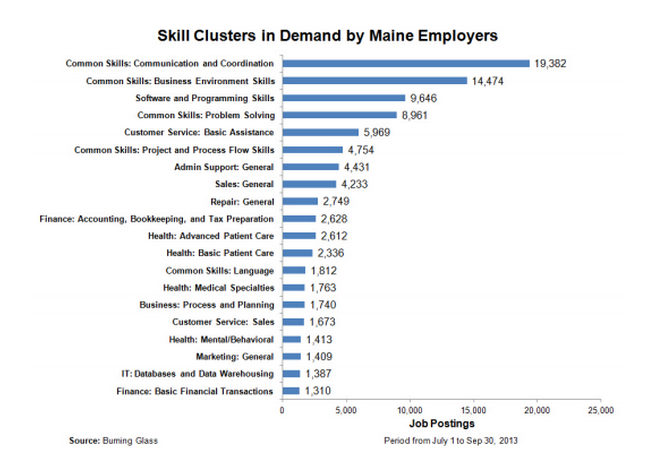
From the report:
Maine employers overwhelmingly call for the communication and coordination skills required for the high degree of interaction demanded in the modern workplace in the jobs they post.
Additionally, most job postings emphasize business environment skills that stress fundamental workplace behaviors such as compliance with work rules, timeliness, and proper attire.
Employers consistently express frustration with deficiencies in these fundamental employability skills in some sectors and occupational categories, particularly among entry level workers.
In Maine Workforce Outlook 2012-2022, released in January 2015, the Maine Department of Labor reported that:
The nature of work increasingly demands higher levels of literacy and more sophisticated technology competencies.
The primary performance attributes of jobs in growing occupations are concentrated around critical thinking, problem solving, reading comprehension, effective communication, and decision making.
Those contrast with the primary work activities or knowledge requirements of occupations that are expected to have the highest rates of job loss, which include handling and moving objects, controlling machines, repairing and maintaining equipment, and clerical functions.
Source: http://www.maine.gov/labor/cwri/publications/pdf/Maine_Workforce_Outlook_2012_to_2022.pdf
What are the best ways to model and help students master these work and life competencies? What learning environments are most conducive to 21st-century learning?
A 2014 Gallup-Purdue survey of nearly 30,000 Americans with a bachelor’s degree or higher found that the odds of thriving in all areas of well-being of life after college were 4.6 times higher if the respondent was “engaged at work.” The factors that increased the odds of being engaged at work included the following experiences:
Source: http://www.gallup.com/poll/168848/life-college-matters-life-college.aspx
Maine’s university and college students are requesting more real-world experiences, too. Preliminary data from a survey of computing and IT students within the University of Maine System, conducted in December 2013, suggested three of the top 5 activities students say help them succeed in their programs are:
Even earlier in one’s education — in grades 5-12 — relevant experience and engagement are significant indicators of future well-being. Two million students have taken the Gallup Student Survey since 2009.
“Research has shown that hope, engagement, and well-being are actionable targets and indicators of success, with links to grades, achievement scores, retention, and future employment.
- Hope: the ideas and energy we have for the future. Hope drives high school students’ attendance, credits earned, and GPA
- Engagement: the involvement in and enthusiasm for school. Engagement distinguishes between high-performing and low-performing schools
- Well-Being: how we think about and experience our lives. Well-being results tell us how students are doing today and predict their future success.”
Source: http://www.gallupstudentpoll.com/177179/gallup-student-poll-brochure-2014.aspx
The results, available by district and by school, include recommendations for parents, educators, business people and neighbors.
So, since these life/work competencies and real world experiences are considered important by so many of our constituents — and our future high school students will be asked to demonstrate mastery of them — how can we best work together to support student’s continuous development of those competencies?
Based on the above trends, we can envision a future where lifelong learners work together on college, career, and civic activities — at work, at home, and within their community — that benefit from, and improve, their mastery of foundational life skills.
However, there are many different models used around the country to describe these competencies:
Indeed, the National Academies is currently engaged in developing correlations between many of these models.
Source: http://www.sri.com/sites/default/files/publications/imports/21st_century_skills.pdf
At Project>Login (a program of Educate Maine), we are focused on helping students prepare for their futures — at home, at work, and in the community — so we have chosen to build on the US Department of Labor competency model, which details the facets of personal-effectiveness, basic academics, and workplace competencies, learning, working, and thriving anytime and anywhere. We call these three levels the “Foundational Life Skills.”
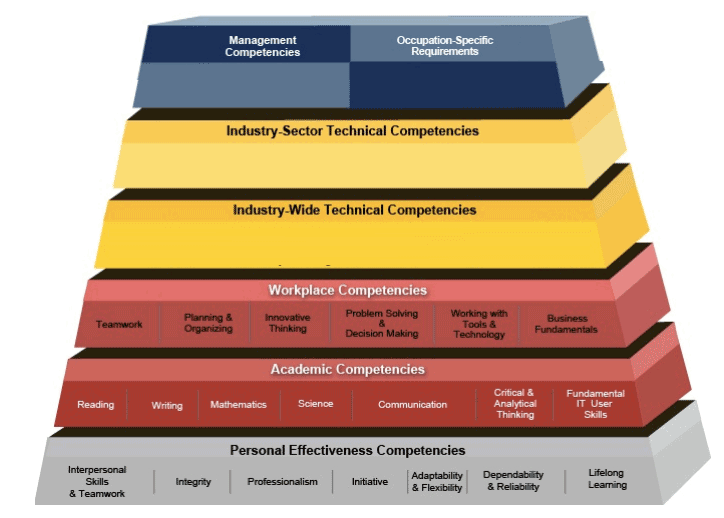
Source: http://www.careeronestop.org/CompetencyModel/pyramid_definition.aspx
Occupational skillsSource (US Department of Labor): <http://goo.gl/GBLzGN>
In additional to foundational skills, the US DOL also developed a comprehensive competency model for the Information Technology (IT) industry. The model is a compilation of competencies that can be included as a basis for preparation in an IT occupation.
Detailed outline: https://checkvist.com/checklists/442082
In 2012, California community college and workforce collaboratives completed a study validating those occupational competencies with California employers.
The study engaged 782 representatives of California companies, with direct knowledge of their ICT workforce needs, producing statistically significant findings about the foundational competencies expected of IT workers, in ICT industries, and in all industries – and for Digital Literacy for all as a 21st century basic skill.
This provides valuable guidance to ICT educators wanting to know what to teach, to workforce investment boards wanting to assist their clients and to policymakers and other planners trying to meet strategic needs…
We can report with 99% confidence the agreement of CA employer representatives with direct knowledge of ICT workforce needs.
Source: http://www.mpict.org/newsletters/q113/article_California-Employers-Validate-US-DOL-IT-Competency-Model.html | Full report (PDF): http://www.mpict.org/pdf/CA_ICT_Competencies_2013.pdf
On top of the foundational skills (personal, academic, and workplace) are the deeper academic practices and career-specific competencies.
We have integrated nationally-defined practices in English Language Arts, Math, Science, and Social Studies, as well as computational thinking and computing and IT competencies into our full competencies and practices stack:
Outline of competencies and practices: <https://checkvist.com/checklists/442082>
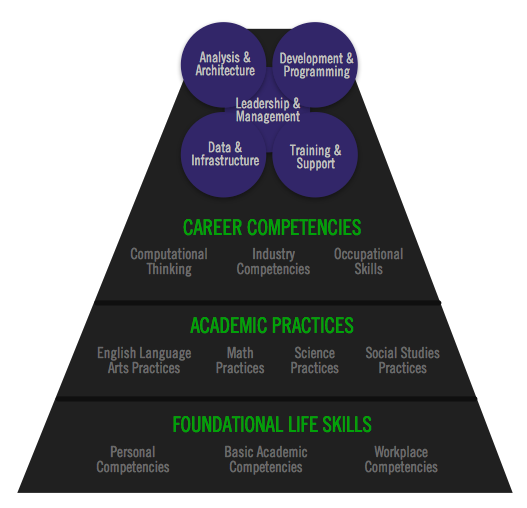
We are focusing on the practices portion of the Common Core, Next Generation Science, and Social Studies standards: the overarching competencies in each area. We believe these are the most important competencies to master for lifelong learning.
We are interested in learning how a set of common rubrics, formative and summative assessments — as well as micro-credentials like open digital badges — could be used to help students master these competencies and practices in many different settings, including before, during, and after school learning, especially forunderrepresented, underprepared, or low-income students.
This is especially important for students who are passionate about tech because only about 10% of secondary schools offer Computer Science courses, and extended learning opportunities — before and after the school day — are a primary opportunity for tech exposure and experience for many students.
With an easy-to-understand method for understanding and communicating learning outcomes, educators, staff, and volunteer coaches could all align learning activities to the competencies and practices that lead to proficiency.
To help learners, teachers, and coaches alike, we have begun translating the foundational life skills into a common format for learning outcomes. Here are sample rubrics for Personal Effectiveness Competencies using a 4 point scale, where 3 indicates proficiency.
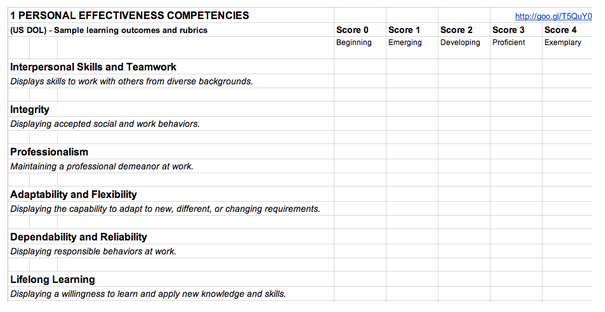
Alternatively, when deeper learning is desired, each of the Personal Effectiveness Competencies can be explored. This version “opens up” Interpersonal Skills and Teamwork to tease out the deeper meanings of each one.
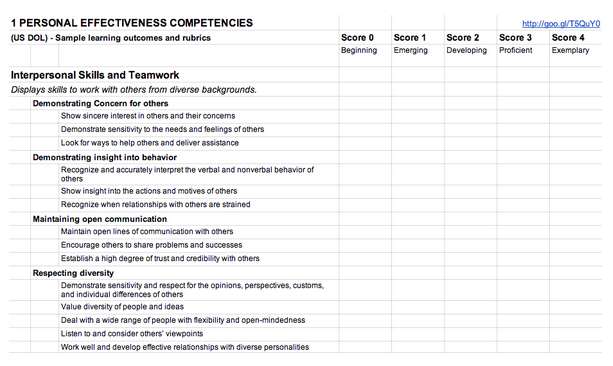
Source: http://goo.gl/T5QuY0
We have also developed guides to assist with coaching and assessment of Maine’s Guiding Principles. Here are samples developed for the Portland Public Schools as part of the Maine State of Learning pilot.

Learner works through a project that provides an opportunity to demonstrate skill according to Maine DOE Learning Results Guiding Principles.
Student demonstrates proficiency in GP rubrics: http://goo.gl/STkJlJ Adult mentor observes demonstration of proficiency (level 3) using rubrics based on MLR GP.
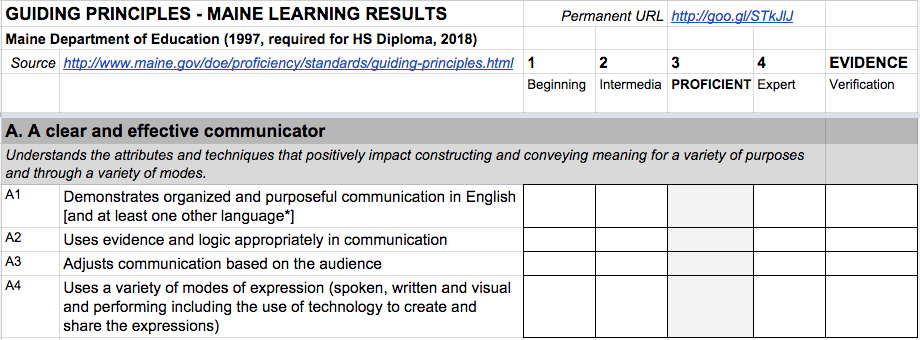
Source: http://goo.gl/STkJlJ
Beyond mastering foundational competencies applicable across many facets of life and work, many students sparked by digital technologies will want to find out if careers in computing and IT might be right for them. We want to help students find the careers that match match their interests.
The Holland Themes approach toward matching careers with upon personality types has been integrated into the US Department of Labor ETA free online database, The Occupational Information Network (O*NET) for over 20 years.
According to the Committee on Scientific Awards, Holland’s “research shows that personalities seek out and flourish in career environments they fit and that jobs and career environments are classifiable by the personalities that flourish in them.” Holland also wrote of his theory that “the choice of a vocation is an expression of personality.”
From Wikipedia: http://en.wikipedia.org/wiki/Holland_Codes
We have analyzed US Department of Labor data to identify the 20+ careers most closely related to computing and IT occupations, rank them by projections of job growth (absolute and percentage) and wages, and placed them into groups based on Holland Themes.
As a result, we’ve developed our online Professions resources to help K-12 students find the careers that may best match their personal interests.
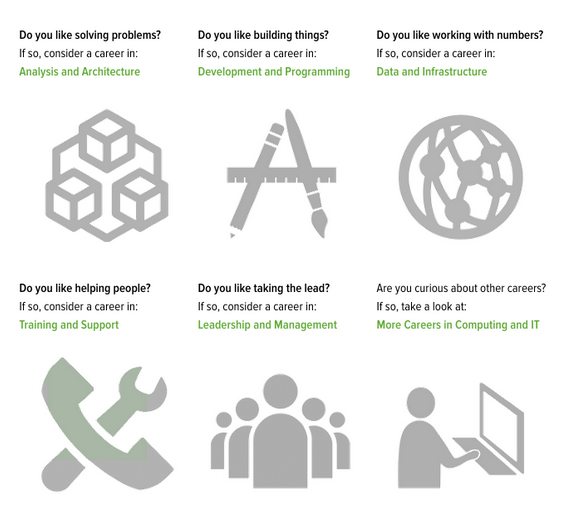
But how will students indicate they’ve mastered foundational competencies, academic practices, or career skills? And how would employers find them?
One promising option is to demonstrate proficiencies via micro-credentials, such as open digital badges.Here is an introduction from the Mozilla Open Badges Alliance.
A digital badge is an online representation of a skill you’ve earned. Open Badges take that concept one step further, and allow you to verify your skills, interests and achievements through credible organizations. And because the system is based on an open standard, you can combine multiple badges from different issuers to tell the complete story of your achievements — both online and off. Display your badges wherever you want them on the web, and share them for employment, education or lifelong learning.
Open Badges make it easy to…
- Get recognition for the things you learn. Open Badges include a shared standard for recognizing your skills and achievements and helps make them count towards job opportunities and lifelong learning.
- Give recognition for the things you teach. Anyone who meets the standard can award badges for skills or learning.
- Display your verified badges across the web. Earn badges from anywhere, then share them wherever you want—on social networking profiles, job sites and on your website.
- Verify skills. Employers, organizations and schools can explore the data behind every badge issued using Mozilla Open Badges to verify individuals’ skills and competencies.”
The founder of the Open Badges movement, Erin Knight, lives in Maine.
- Source: http://www.openbadges.org/about/
Lifelong and lifewide learning: anytime and anywhere
We can envision a future where lifelong learners would work together on college, career, and civic activities — at work, at home, and within their community — that benefit from their proficiency in foundational life skills.
By applying a proficiency-based learning approach to these competencies, we could build bridges between:
- K-12 schools (Maine’s Guiding Principles/ASCD Habits of Mind) and
- After school programs (such as 21stCCLC/4H) and
- Colleges and university academic programs (Essential Skills) and
- Real-world experiences such as internships and apprenticeships and,
- Thriving beyond college
Appendices
Maine Job Outlook to 2022 – January 2015
From the Maine Department of Labor
Occupational Outlook – STEM Jobs
Report after report over the last two decades from educational, trade, and other interest groups exhorted the need to educate more people for STEM* jobs. Many portray an impending shortage of workers in highly skilled, well-paying science, technology, engineering, and math based occupations. Most treat STEM jobs as a homogeneous group with similar growth prospects.
The problem with these characterizations is that there is a great deal of diversity of functions and an equally wide range in growth prospects not only between science and technology, for example, but also the range of occupations within sciences, within technology, within engineering, and within mathematics. The variety of STEM occupations creates very different growth prospects.
Under the Standard Occupational Classification system used by economic agencies to classify and count jobs there are 653 occupations in which there is employment in Maine and for which we have developed projections. Of that number, 181 occupations are designated as STEM by either the O*Net consortium or the U.S. Bureau of Labor Statistics. Collectively, the number of jobs in those 181 occupations is expected to rise 6.5 percent from 2012 to 2022, which is nearly three times the rate for all occupations. The expected gain of 6,800 jobs in STEM occupations accounts for 46 percent of expected net job growth.
Individually, 107 of those STEM designated occupations are expected to grow faster than average, another 13 are expected to grow more slowly than average, and 61 are expected to be unchanged or lose jobs. Like other types of functions, slowly growing or declining STEM occupations generally are those being impacted by new or changing technologies that are improving or replacing processes.
*Science, Technology, Engineering and Mathematics
Occupational Outlook – The Nature of Work
Work attributes valued in growing and declining occupations differ.
Growing Occupations: Critical thinking, problem solving, decision making, mathematics, reading comprehension, deductive reasoning, processing information, analyzing data
Declining Occupations: Machinery operation, equipment inspection, tool selection, physical strength, following instructions, manual dexterity, clerical functions
The nature of work increasingly demands higher levels of literacy and more sophisticated technology competencies. The primary performance attributes of jobs in growing occupations are concentrated around critical thinking, problem solving, reading comprehension, effective communication, and decision making. Those contrast with the primary work activities or knowledge requirements of occupations that are expected to have the highest rates of job loss, which include handling and moving objects, controlling machines, repairing and maintaining equipment, and clerical functions.
Detailed projections for individual industries and occupations are available at www.maine.gov/labor/cwri/outlook.html.
2007-15: American Association of Colleges and Universities Employers Surveys
The majority of employers continue to say that possessing both field-specific knowledge and a broad range of knowledge and skills is important for recent college graduates to achieve long-term career success. Very few indicate that acquiring knowledge and skills mainly for a specific field or position is the best path for longterm success…
Employers say that when hiring, they place the greatest value on demonstrated proficiency in skills and knowledge that cut across all majors. The learning outcomes they rate as most important include written and oral communication skills, teamwork skills, ethical decision-making, critical thinking, and the ability to apply knowledge in real-world settings. Indeed, most employers say that these cross-cutting skills are more important to an individual’s success at their company than his or her undergraduate major.
